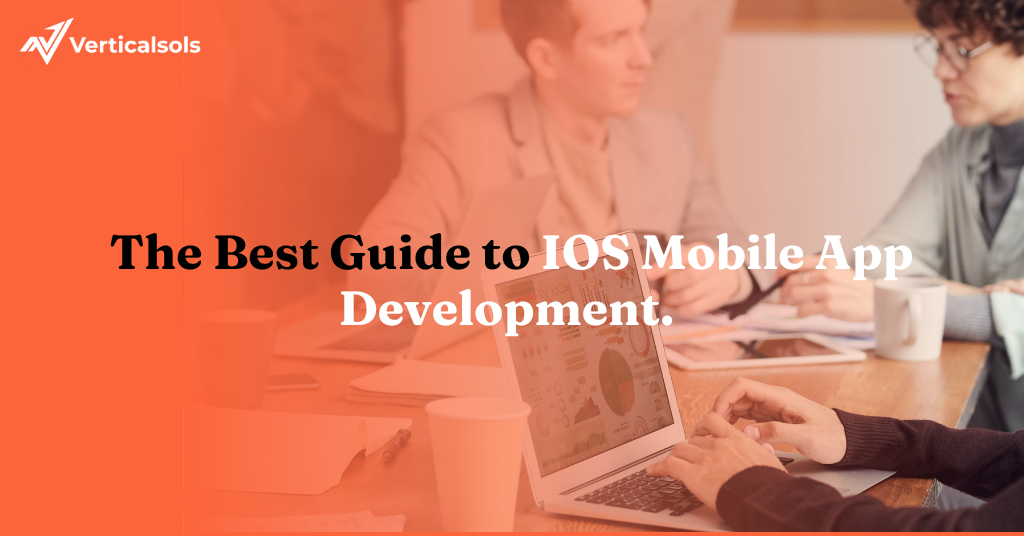The Best Guide to iOS Mobile App Development.

Verticalsols
24/07/2023
8 minutes

JOIN OVER 7,000+ SUBSCRIBERS
Don't miss out on Insights to boost your business.
Email*

IOS Mobile App Development is now your cup of tea.
We at Verticalsols are aware of the enormous potential that IOS app development has in the current digital environment.
With millions of IOS users around the world, creating a in demand and user-focused software for this platform can result in impressive business growth and success.
Through the provision of latest, specialized services for IOS app development and it is our objective to enable businesses to fully realize this potential.
Why Do You Want Verticalsols to Develop Your iOS App?
- Customized Solutions: We think that as every company is different, so should be its app. Our strategy centers on comprehending your unique needs and creating solutions that are entirely in line with your brand.
- User-Centric Design: Our app development methodology is centered on the user experience. We design user-friendly interfaces with eye-catching visuals that captivate consumers and improve their entire experience.
- Modern technologies: It's essential to stay ahead in the quick-paced world of technology. We use the most recent frameworks and technologies, such as Swift and SwiftUI, to create cutting-edge, fast iOS applications.
- Seamless Integration: Our staff is skilled at incorporating various functionality and features into your software in a seamless manner to ensure its optimal performance.
- Quality Assurance: We are steadfast in our dedication to quality. The highest requirements are met by delivering flawless, bug-free programmes that have undergone rigorous testing and debugging procedures.
- Delivery on Time: We are cognizant of the value of time in the corporate sector. You can count on rapid project delivery from Verticalsols, which will help you get to market more quickly.
- Ongoing Support: Our collaboration doesn't end with the release of the app. To keep your app updated and performing at its best, we offer continuous support and maintenance services.
Verticalsols offers end-to-end iOS app development solutions.
The Best Guide to iOS Mobile App Development.
I. Introduction
The creation of iOS mobile apps has grown to be a lucrative industry with considerable market potential. With the help of this thorough manual, ambitious iOS developers will be able to create their very first iOS app from scratch. From creating the development environment through submitting the app to the App Store, we will examine the key facets of iOS app development.
II. Development Environment
Getting a Mac machine and fulfilling the necessary macOS prerequisites is the first step in starting an iOS app development project. After the essential hardware has been installed, Xcode, Apple's integrated development environment (IDE) for iOS app development, will be installed. We'll also discuss how to register for the Developer Programmed and create an Apple Developer account in order to obtain access to the necessary materials.
III. Programming Language
Swift and Objective-C are the two main languages available to iOS developers. We'll contrast these dialects and explore why Swift is the language of preference for creating contemporary iOS applications. Basic concepts of Swift, including as variables, data types, control flow, and functions, will also be covered in this part.
IV. iOS App Architecture
The success of an iOS app depends on its User Interface (UI), which must be both aesthetically pleasing and simple to use. We'll go over how to design UI elements like Views, Buttons, Labels, and Images using Interface Builder and Storyboards. We'll also discuss delegation and how app components communicate with one another.
V. Creating the User Interface
The success of an iOS app depends on its User Interface (UI), which must be both aesthetically pleasing and simple to use. We'll go over how to design UI elements like Views, Buttons, Labels, and Images using Interface Builder and Storyboards. Additionally, Auto Layout will be investigated to ensure adaptive UI for various iOS devices.
VI. Implementing App Functionality
We'll talk about how to implement app functionality in this part, including how to handle user input and events. To improve app functionality, we'll use built-in frameworks and APIs like Core Data and Core Location. We'll also show you how to incorporate multimedia capabilities like the camera, audio, and video.
VII. App Navigation and User Experience
The success of an app depends on a seamless user experience and navigation flow. We'll look at how to organize app navigation using tab bar controllers and navigation controllers. We'll also employ animations and gestures to improve the user experience as well as segues and transitions between views.
VIII. Data Storage and Persistence
For an app to perform properly, data management knowledge is essential. For local data storage and retrieval, we'll introduce SQLite and CoreData. In order to protect user data, we'll also talk about data security and encryption.
IX. Testing and Debugging
Delivering a stable software requires extensive testing and troubleshooting. Using the XCTest framework, we'll discuss unit testing and user interface testing. We'll also use Xcode's debugging tools to find and resolve problems. Before submitting to the App Store, beta testing via TestFlight will also be investigated.
X. Publishing the App to the App Store
We'll set up the app for submission to the App Store in this part. To ensure compliance, we'll study the App Store policies and best practices. Additionally, we'll assist developers with uploading the software and overseeing the release procedure.
XI. App Marketing and Distribution
Effective marketing and distribution methods are necessary for a great app. We'll offer developers advice on how to design an app marketing strategy and advertise the app via various media. We'll also stress the value of keeping an eye on customer reviews and app performance.
XII. Maintenance and Updates
The journey of an app doesn't end with its publication. We'll talk about how crucial it is to keep track of performance indicators and app crash data. It will be addressed how to deal with user comments and bug complaints as well as how to plan and implement app upgrades and new features.
XIII. Advanced Topics in iOS Development
This section will cover advanced subjects including dealing with frameworks like ARKit and CoreML for developers looking to deepen their knowledge. In-app purchases and push alerts will also be integrated as we look at modern app development techniques like SwiftUI and Combine.
XIV. In a Nutshell:
We'll present a thorough summary of the iOS app development process along with the most important lessons learned. We'll inspire developers to keep picking up new tricks and honing their iOS coding abilities. Finally, we'll talk about future developments in iOS app development and prospective job options.
In conclusion, the purpose of this guide is to provide prospective iOS developers with the skills they need to make unique, user-centered apps. Developers can set out on a fruitful journey in the world of iOS app development with confidence and expertise by adhering to this thorough plan.
Questions and Answer:
What languages for iOS mobile app development?
Languages for iOS mobile app development:
Swift: Apple's preferred modern and user-friendly language for iOS development.
Objective-C is the traditional language for older iOS app development, and it is still pertinent for app maintenance.
Is Python used for iOS app development?
Python is an excellent language for iPhone application development. It is user-friendly and suitable for data science duties such as data analysis and machine learning. By adhering to a few basic guidelines, it is possible to get started with Python for iPhone app development.
Is it easy to develop apps for iOS?
You do not require prior experience to immediately begin developing apps for Apple platforms. Apple's app development curriculum makes it simple for anyone to code in Swift like a pro, whether for a semester in school, for professional certification, or to improve their skills.
Is Swift easier than Python?
Python has the simplest and most legible code that adheres to both subject-oriented and procedural forms of language. The language's extensibility and support for open-source libraries make it an expansive language to learn.
Is it difficult to learn Swift?
Swift is simple to learn, even without prior programming experience. Apple designed it to be a beginner-friendly, efficient, and simple programming language. Download Swift Playgrounds to learn the programming language through gamified Apple-designed lessons.
Can I use Python on Xcode?
The answer is affirmative. You can write Python code in XCode, allowing you to create Apple applications utilizing the flexibility and simplicity of Python. Creating art on a high-quality canvas is analogous to using a preferred implement.
Table of Contents


Verticalsols
In this fast-paced digital landscape, I am dedicated to sharing my knowledge and insights with fellow marketers and entrepreneurs. Whether it's through blog posts, webinars, or consulting, I am committed to helping businesses navigate the digital maze and thrive in the digital age.
Related Posts
SOFTWARE DEVELOPMENT SERVICE
Web Development
- Verticalsols.com
- 34 N Franklin Ave Ste 687#1936 Pinedale, WY 82941
- info@verticalsols.com
- +1 786 224 2151
© 2022-2024
Verticalsols LLC